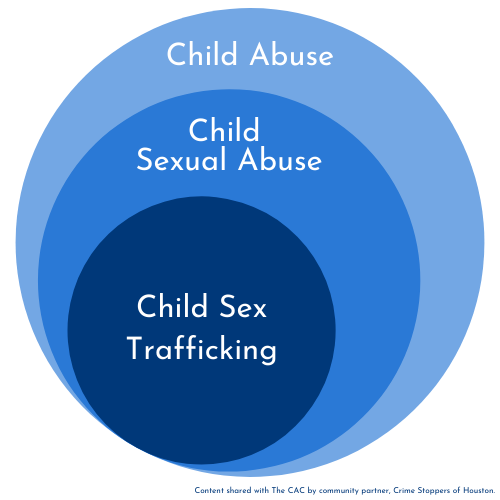 Dear Friend and Supporter,
Dear Friend and Supporter,
Just because our community isn’t talking about child sex trafficking doesn’t stop it from happening. Children are being traded for money on our streets every single day in Houston. In fact, there are more brothels in Houston than there are Starbucks[1]. Houston is one of the main hubs of trafficking within the United States. Houston’s cultural diversity makes it easy for victims to blend in with the rest of the community. Houston is also directly connected to the border, making it a geographically convenient distribution setting for trafficking. The children at our schools, playgrounds, and streets should not be for sale.

Child trafficking can happen to anyone because children can be groomed in any setting. The majority of children are lured into trafficking by family members or someone they already know – this can be a classmate, an employer, or even a family friend. During times of social isolation, children are even more at risk of being exploited online. These children are from all kinds of backgrounds – foster care, all socio-economic classes, runaways, the juvenile legal system, and all ethnicities.
Survivors of trafficking are likely to face negative outcomes throughout their lives. Studies have shown that teenage survivors of trafficking report severe health consequences, including memory problems, substance abuse, insomnia, sexually transmitted infections, and pregnancy[2]. Psychological effects among survivors are also common, including stress-related diseases, anxiety, suicidality, depression, mood swings, and PTSD[3]. Recovering from these effects often requires continued care by trained professionals.
The CAC strives to help victims of child sex trafficking and their families recover through trauma-informed care. We provide mental health services for both child sex trafficking victims and their caregivers. In an effort to prevent trafficking before it ever occurs, our clinicians have developed a training for preventing commercial sex trafficking amongst youth. Our medical team provides full medical evaluations and ongoing medical care. Children often are recovered from trafficking without any basic hygiene items or clothing, and we stay stocked with these items to ensure no child has to go without. We have trained family advocates to provide referrals to families and support the child throughout this process. Children referred for mental health services are scheduled as priority cases to receive treatment as soon as possible. We work diligently to provide therapy services and forensic interviewing both in-person and virtually to ensure we can help as many children as possible. We partner with other organizations in our community involved in the fight against trafficking to provide resources, including transportation vouchers and items that children need once they are recovered. So that no one is ever excluded for financial reasons, we provide all of these services for free to children and families.
So many people in our community want to know how they can help and what signs to look for. We provide year-round trainings to law enforcement, medical professionals, mental health professionals, teachers, and the community on recognizing and reporting trafficking. We know that in order to help prevent new child sex trafficking victims, we must educate those around us on the importance of prevention. The dangers of trafficking are real, and children need our help.
To traffickers, children are an even better commodity to trade than drugs. Drugs can only be used once, but sadly, children can be used for sex over and over again. It is horrific to know that children are being sexually abused in Houston every day. The truth is that all child sex trafficking is child abuse. Adults make the decision to buy sex from children. Children do not get a choice. They are psychologically manipulated and often forced into living this life of abuse. No child wants to be used for sex. No child should ever have to live with this trauma for the rest of their lives.
We need your help to give these children a voice and rescue them from trafficking. To Report a Human Trafficking Tip, please call the National Human Trafficking Resource Center Hotline at 1-888-373-7888 or visit humantraffickinghotline.org
Jennifer Hill, J.D.
Assistant Executive Director
The Children’s Assessment Center
Red Flags for Sex Trafficking
How To Report Human Trafficking/ What To Do If You Suspect Trafficking
[1] Rescue Houston.
[2] Lederer L, Wetzel C. The health consequences of sex trafficking and their implications for identifying victimsiIn healthcare facilities. Annals of Health Law 2014; 23:1.
[3] Countryman-Roswurm KI. It’s more than just my body that got hurt: The psychological consequences of sex trafficking. J of Trafficking, Organized Crime and Security. 2015; 1(1):1-8.
